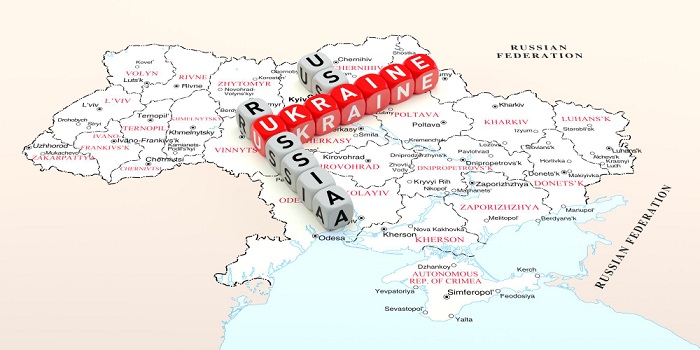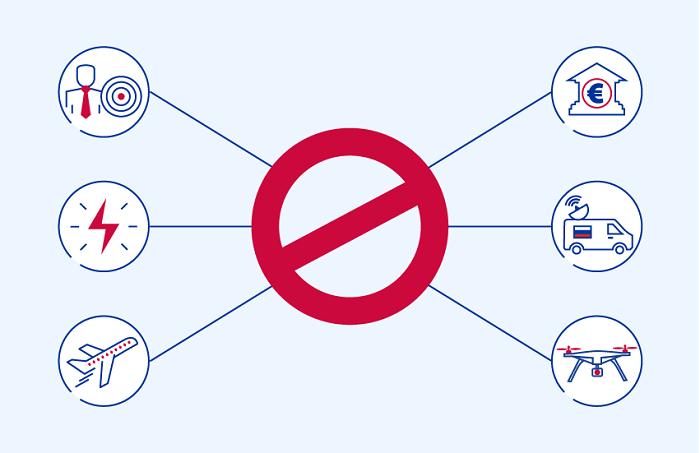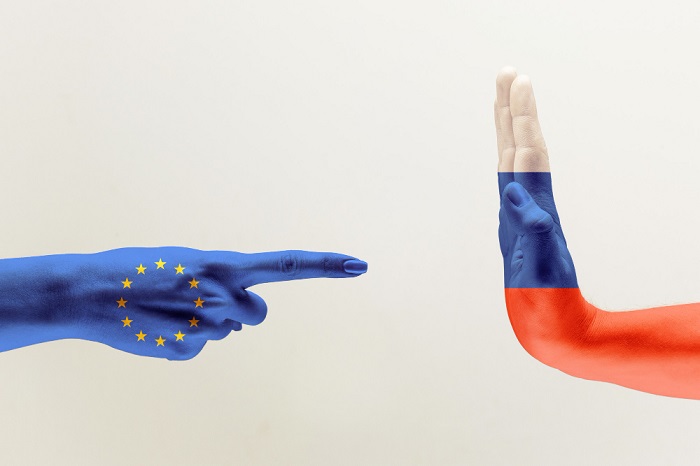Introduction
Sanctions on Russia have been imposed by the European Union. This deterrent measure, a critical aspect of both Cross-Border & International Law and specialized Legal Practice & Specialization, was taken by the member states of the EU to settle the dispute between Russia and Ukraine. The war and aggression of Russia against Ukraine has grossly violated International Law and caused massive loss of life and injury to civilians. It has violated International Humanitarian Law; International Humanitarian Law includes principles on creating a distinction between army personnel and civilians. They have also been targeting civilian objects like hospitals, medical facilities, schools, and shelters.

The European Council has demanded Russia stop the act of war and atrocities immediately and withdraw all forces and military equipment from the Ukrainian territory unconditionally. Russia is coerced to settle the dispute by an International community of the EU.
The European Union member states demand Russia fully respect the Ukrainian territorial sovereignty, integrity, and independence within its internationally recognized borders.
What are Sanctions on Russia and its objective?
Sanctions are the penalty that is imposed by one country on the other. The object is to stop the other from acting aggressively and violently contrary to International Law norms and standards. Russian invasion in Ukraine which took place on 24th February 2022 and is still going on.
The European Union has taken some actions against Russia as a form of sanctions. These sanctions have been taken because of the violent attack made by Russia against Ukraine. It has caused the loss of innocent people’s lives. There are three waves of sanctions against Russia that include sanctions against the Russian financial system, its high-tech industries, and its corrupt life. These measures are the largest set of sanctions ever applied in the history of the European Union.
The first target is to affect the economy of Russia. There are several measures which have been taken to do the same. The SWIFT network is a community that exchanges cross-border payments.
The EU has banned the main Russian banks from its network. All the important transactions with the Russian central bank have been banned by the European Union. Other sectors of the Russian economy, such as oil refineries and aircraft, are also the targets of the European Union. The European Union has frozen all those sectors and assets related to those sectors.
These measures have been taken knowing the fact that it is going to impact the economy of European Union members. They want to take a stand against this ruthless aggression and prevent any such activities from occurring in the future. This has been done to ensure the safety and security of the people of the countries.
Let us now see in detail the various sanctions applied on Russia in various sectors and their impact on Russia.
There is another article about sanction by LegaMart:
Sanction Limitation & Exclusion Clause Countries 2022
List of EU Sanctions on Russia
The EU has adopted five packages of sanctions against Russia in response to its unprecedented and unprovoked military attack on Ukraine.
- Ban imposed on the access of Russia to the EU’s capital and financial markets and services.
- There is a ban on the import of certain goods, trade, and investment and an export ban on certain goods and technologies.
- Targeted sanction has also been applied to 336 members by freezing their assets, banning their visas, and prohibiting them from making funds available to them.
- The financial inflow from Russia to the EU has been limited.
- There is a ban on the export of services and technologies that Russian oil refineries use.
- The sale of all aircraft, spare parts, and equipment to Russian Airlines has been banned.
- Export of dual-use goods and technologies such as semiconductors or cutting-edge technologies to Russia has been banned.
- Benefits provided to the Russian diplomats, officials, and business people by the visa facilitation provisions have been canceled.
- Any transactions with the Russian Central Bank have been banned.
- Russian planes and private jets are banned in the EU airspace and airports.
- Seven banks i.e., Bank Otkritie, Novikombank, etc., have been excluded from the SWIFT financial messaging system.
- There are certain projects co-financed by the Russian Direct Investment Fund to which any contribution by the EU is banned.
- The sale and supply of euro banknotes to Russia have been banned.
- The broadcasting of Kremlin propaganda channels such as RT and Sputnik has been banned.
- Ban on the provision of euro-denominated banknotes to Belarus.
- Restrictions on exports of maritime navigation goods and radio communication technology to Russia.
- Trade restrictions for iron, steel, and luxury goods.
- Ban on Russian flagged vessels from entering EU ports
- New import ban on products such as cement, high-end seafood like caviar, rubber products, wood, spirits, alcohol, etc.
- Ban on imports of all forms of Russian coal worth 8 billion per year.
These measures would weaken the Kremlin’s ability to finance the war and the imposition of economic and political costs on Russia, declaring the elite political class responsible for the invasion and war.
Sanctions on Russia: Oil and Gas
Russia is a major exporter of oil and gas to the European Union member countries, and about 25% of oil and 40% of gas in the European Union were imported from Russia. Now the European Union has decided to ban the import of oil and gas from Russia and switch to alternative supplies to impact the economy of Russia. Such a sanction is a form of coercive action taken by the EU to settle the dispute. Such a ban on imports as a sanction is known as an embargo in International Law.
The European Commission has made the above offer to the EU countries, and till now, seventeen EU countries have responded to the request positively. They are also providing technical expertise and assistance to help the EU phase out its reliance on Russian fossil fuels and find out alternatives of the same. This will cut off a significant source of revenue for Moscow. This is done to create pressure in Russia to stop the violence which is occurring in Ukraine.
However, taking such a decision is very difficult for the EU because a very significant proportion of oil and gas is imported from Russia, and a ban on it will affect the EU country’s economy as well.
It will lead to a high rise in the prices of oil and gas in EU nations. The other issue related to the import ban on oil and gas is to find alternative suppliers of the same and line up sufficient land transport for oil heading to its two refineries that are fed by pipelines from Russia. It will also impact the modern industrial plans, which are dependent on these fuels for their working and performance.
Thus it would be challenging to get the consensus of all 27 member states regarding a ban on oil and gas as there are some countries like Germany and Italy that are highly dependent on Russia for their fuels, and they might want to roll out such a measure.
The final decision to ban the import of oil and gas from Russia is still pending. It is expected to go through the final round of negotiation after the final round of French elections, which is scheduled on April 24th.
This decision is kept for the post-French polls because they don’t want the price hike to affect the elections of the country. The decision will be taken keeping in mind
Economic Sanctions on Russia
Economic sanctions are those sanctions in which countries withdraw their customary trade and financial relations with the country at fault. The country on which such sanctions are imposed does suffer an economic loss due to the prohibition of commercial activities.
Some of the economic sanctions which have been imposed in the past are the U.S. embargo on Cuba, in which transactions were blocked by and with particular businesses, groups, or individuals. All these sanctions aim to reinforce pressure on the Russian government and economy and to limit the Kremlin’s resources for the aggression.
Similarly, economic sanctions have been imposed by the European Union on Russia because of the atrocities committed by Russia in Ukraine. These measures are taken to create a negative impact on trade and business, which will force the other country to settle the dispute and maintain peace around the world. This is one of the coercive methods of dispute settlement under Public International Law.
Russia is prohibited from providing technical assistance or brokering, construction, or engineering services directly relating to infrastructure in the specified territories, in the telecommunications, transport, energy, and oil production sectors.
Currently, the sanctions have been imposed till 31st July 2022. The economic sanctions include financial, trade, energy, transport technology, and defense sectors in which the sanction has been applied.
There are more than 600 private sector companies that have left the market of Russia as a step to support Ukraine and international peace and stand against the Russian atrocities.
The dual-use goods and technology that contribute to Russia’s defense and security appliances have been prohibited from being exported to them. No trade-in of arms is allowed in Russia. Road transportation from Russia has been banned, and no operators can enter the member nations of the European Union.
The industrial capacity of Russia gets strengthened by the kerosene and other goods which get exported to Russia from member nations of the European Union. The exports have been banned from affecting the industrial sector of the country.
One of the leading financial restrictions imposed on Russia is a ban on the participation of Russian companies in public procurement and a ban on any form of financial support to the Russian public institutions.
They are looking forward to imposing further restrictions and ban on banks and financial firms in Russia as an initial step toward ending the country’s coal and gas import relations.
There is a prohibition on the purchase and sale of transferable securities and bonds issued by the Russian Government. The people of EU nations are not allowed to purchase or sell investment services of transferable securities, which also include crypto-assets and money market instruments.
There is a prohibition on dealings with non-government-controlled areas of Crimea, Donetsk, and Luhansk, and no goods that originated in this area can be imported to the EU member nations.
Impact of Sanctions on Russia
The sanctions are imposed to achieve two kinds of objectives which are political and economic. EU sanctions on Russia have both political as well as economic objectives to achieve. The political objective will be achieved only after the end of the war between Russia and Ukraine. Let us understand the effect and effectiveness of EU sanctions on Russia.
Due to the cut-off of Russian financial Telecomm and the freezing of foreign reserves in Russia, cross-border and hard currency payments have become extremely difficult and costly for Russia. The export control on the key technologies is most likely to have a significant effect on the Russian economy.

Russia is expected to default on billions of dollars in foreign debt because many multinational companies are pulling out of the country, taking their product, services, and jobs with them.
Since the stock exchange of Russia has been frozen since the start of the war, it has been 30% down against the dollar. There is rampant inflation in the country, which is around 9% and cannot be erased by the central bank efficiently because the central bank also has to be very sparing with its reserves due to the imposition of sanctions on Russia.
It has been contended by economists and analysts that the sanctions on the currency reserves of the central bank are going to be more dangerous than the ban on the import of gas and energy from Russia to EU member nations.
This has been analyzed on the ground that gas export from Russia accounts for only 13% of the Russian budget revenue, which is not going to create as much impact. Instead of Russia, the European Union member nations are going to suffer the impact of this ban on export as they will have to find other alternatives from other countries, which will be difficult for countries like Germany especially.
The economic sanctions will also hit luxury goods exported to Russia, and it will also make life somewhat more uncomfortable for Russia. The sanctions are not as effective as they should be in creating a deterrent effect on Russia.
The reason is that European nations are scrambling to protect their populations from the effects of higher energy costs via price caps and subsidy schemes. The EU nations also aim to protect their nation from an economic hit that might be caused by the strict sanctions on Russia.
The sanctions will definitely have long-term implications, such as price implications from energy to the entire economy, which will happen relatively sooner. Even before the sanction banning oil and gas, buyers have refrained from purchasing Russian crude due to the financial uncertainty and possibility of disruption of the supply chain.
This has caused a surge in the price of the international benchmark, which went beyond $110 a barrel in March 2022. Germany gets 50% of its natural gas supply from Russia, and it is difficult for Germany to find an alternative. The sanctions on Russia are going to result in an inflation rise in Europe.
More than 800 McDonald’s restaurants have closed down post-European sanctions. Many other western companies like Goldman Sachs and KPMG have withdrawn from the Russian market.
Conclusion
International experts are saying that the major impact of EU sanctions on Russia will be visible after some time as it is a gradual process. The economy is going to suffer a huge economic crisis due to various sanctions and embargoes imposed as a response from the international community to the atrocities that were caused by Russia in Ukraine.
It will become clearer with passing the time. The Russian stock market has lost over a quarter of its value and had to remain shut for almost a month. The investments in Russia are drying up, and there is a sudden rise in inflation due to declining imports. It is going to hamper the growth and development of the country on a long-term basis.
LegaMart is a global legal platform designed to connect individuals, startups, and businesses with qualified lawyers across jurisdictions. With a mission to simplify cross-border legal services, LegaMart provides users with access to a diverse network of vetted legal professionals who specialize in areas such as international law, corporate law, immigration, dispute resolution, and more.
By leveraging technology and user-friendly tools, LegaMart allows clients to search for lawyers by country, language, or legal expertise, submit their legal queries, and receive tailored legal solutions in a streamlined, efficient manner. The platform serves as a bridge between legal professionals and clients who need multilingual, multi-jurisdictional support — especially in today’s increasingly globalized legal landscape.
Whether you’re an entrepreneur launching a business abroad, an individual dealing with immigration paperwork, or a company navigating cross-border compliance, LegaMart aims to make legal help more accessible, transparent, and collaborative.




